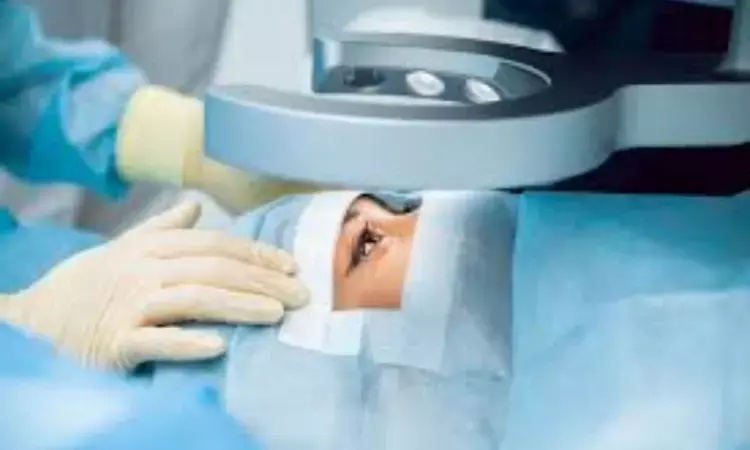- Home
- Medical news & Guidelines
- Anesthesiology
- Cardiology and CTVS
- Critical Care
- Dentistry
- Dermatology
- Diabetes and Endocrinology
- ENT
- Gastroenterology
- Medicine
- Nephrology
- Neurology
- Obstretics-Gynaecology
- Oncology
- Ophthalmology
- Orthopaedics
- Pediatrics-Neonatology
- Psychiatry
- Pulmonology
- Radiology
- Surgery
- Urology
- Laboratory Medicine
- Diet
- Nursing
- Paramedical
- Physiotherapy
- Health news
- Fact Check
- Bone Health Fact Check
- Brain Health Fact Check
- Cancer Related Fact Check
- Child Care Fact Check
- Dental and oral health fact check
- Diabetes and metabolic health fact check
- Diet and Nutrition Fact Check
- Eye and ENT Care Fact Check
- Fitness fact check
- Gut health fact check
- Heart health fact check
- Kidney health fact check
- Medical education fact check
- Men's health fact check
- Respiratory fact check
- Skin and hair care fact check
- Vaccine and Immunization fact check
- Women's health fact check
- AYUSH
- State News
- Andaman and Nicobar Islands
- Andhra Pradesh
- Arunachal Pradesh
- Assam
- Bihar
- Chandigarh
- Chattisgarh
- Dadra and Nagar Haveli
- Daman and Diu
- Delhi
- Goa
- Gujarat
- Haryana
- Himachal Pradesh
- Jammu & Kashmir
- Jharkhand
- Karnataka
- Kerala
- Ladakh
- Lakshadweep
- Madhya Pradesh
- Maharashtra
- Manipur
- Meghalaya
- Mizoram
- Nagaland
- Odisha
- Puducherry
- Punjab
- Rajasthan
- Sikkim
- Tamil Nadu
- Telangana
- Tripura
- Uttar Pradesh
- Uttrakhand
- West Bengal
- Medical Education
- Industry
Diabetes Patients may face increased risk of complications After Cataract Surgery, suggests study

Cataract Surgery
A recent study revealed concerning findings regarding the relationship between diabetes type and post-cataract surgery complications. The study was published in the Canadian Journal of Ophthalmology and assessed the impact of diabetes type on Nd:YAG capsulotomy rates after cataract surgery.
The retrospective cohort study from the the Bristol Eye Hospital in the UK included a total of 53,471 consecutive cataract surgeries performed from 2003 to 2017. The research categorized patients into a nondiabetic group, a type 1 diabetes (T1D) group and type 2 diabetes (T2D) group and then compared the rates of Nd:YAG laser capsulotomies among them.
While 79.8% of the surgeries were in nondiabetic patients, 1.5% were in T1D patients and 18.7% were in T2D patients. The diabetic patients with both T1D and T2D expressed significantly higher rates of Nd:YAG laser capsulotomies when compared to nondiabetic patients. Upon further analysis after adjusting for age and sex, the observed association persisted. The patients with T1D were found to have a 69.2% increased risk, while the individuals with T2D had a 15.7% increased risk of requiring Nd:YAG capsulotomies post-cataract surgery.
These findings highlight the importance of close monitoring of diabetic patients, specially in the individuals with T1D, for the development of posterior capsular opacification following cataract surgery. This complication can significantly impact the vision and quality of life if not addressed promptly.
The study emphasized the significance of ophthalmology screening for the individuals with diabetes. Overall, the outcomes of this study highlight the increased risk diabetic patients face in developing complications post-cataract surgery, she said. It's imperative for healthcare providers to be vigilant in their monitoring and management of these patients to ensure optimal visual outcomes.
The findings of this study contribute to a growing body of evidence that support the need for specialized care and attention to diabetic patients who underwent cataract surgery. As the prevalence of diabetes continues to rise throughout the globe, these initiatives were focused at improving the screening and management of diabetic eye complications are more pivotal than ever. Further research and implementation of targeted interventions are crucial to minimize the burden of post-cataract surgery complications in the diabetic individuals by ultimately enhancing their overall eye health and well-being.
Source:
Cunha, M., Elhaddad, O., Yahalomi, T., Avadhanam, V., Tole, D., Darcy, K., Levinger, E., Tuuminen, R., & Achiron, A. (2024). Type 1 and type 2 diabetes predisposed to higher Nd:YAG capsulotomy rates following cataract surgery: analysis of 53,471 consecutive cases. In Canadian Journal of Ophthalmology. Elsevier BV. https://doi.org/10.1016/j.jcjo.2024.02.014
Neuroscience Masters graduate
Jacinthlyn Sylvia, a Neuroscience Master's graduate from Chennai has worked extensively in deciphering the neurobiology of cognition and motor control in aging. She also has spread-out exposure to Neurosurgery from her Bachelor’s. She is currently involved in active Neuro-Oncology research. She is an upcoming neuroscientist with a fiery passion for writing. Her news cover at Medical Dialogues feature recent discoveries and updates from the healthcare and biomedical research fields. She can be reached at editorial@medicaldialogues.in
Dr Kamal Kant Kohli-MBBS, DTCD- a chest specialist with more than 30 years of practice and a flair for writing clinical articles, Dr Kamal Kant Kohli joined Medical Dialogues as a Chief Editor of Medical News. Besides writing articles, as an editor, he proofreads and verifies all the medical content published on Medical Dialogues including those coming from journals, studies,medical conferences,guidelines etc. Email: drkohli@medicaldialogues.in. Contact no. 011-43720751


